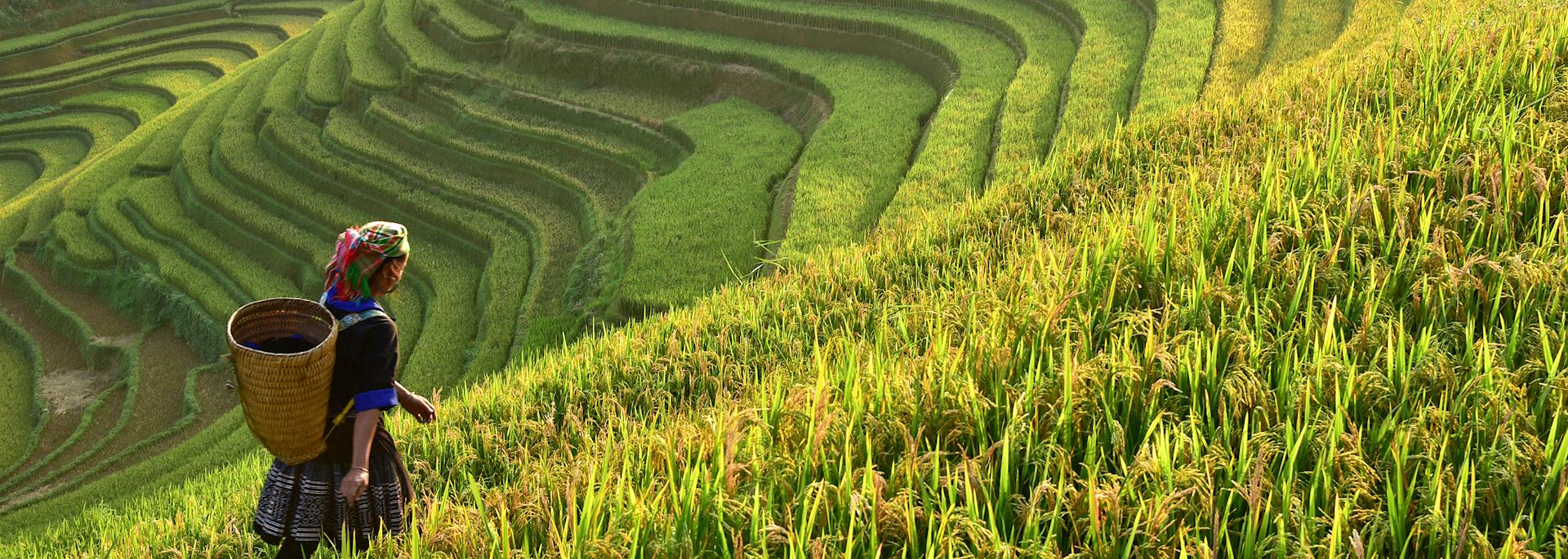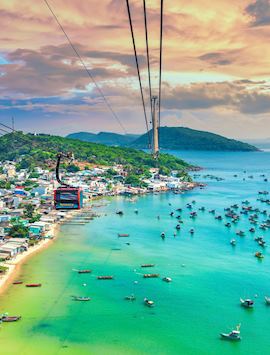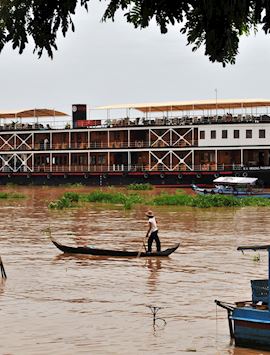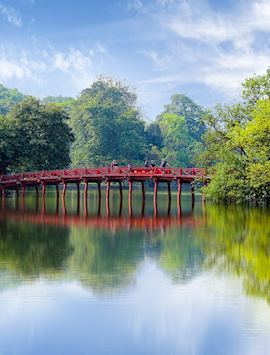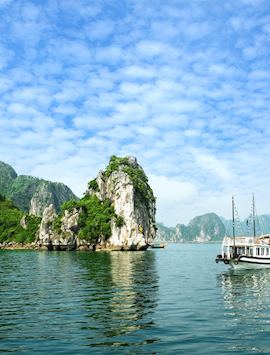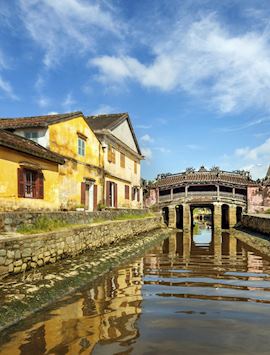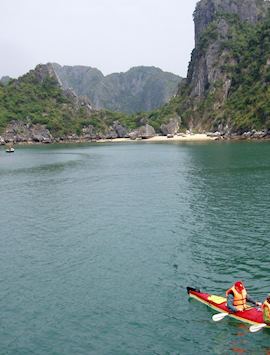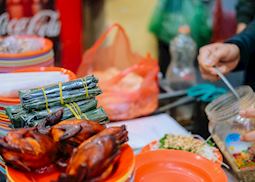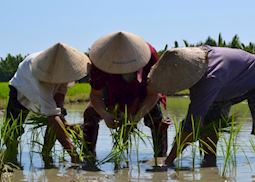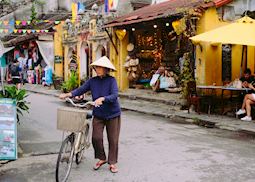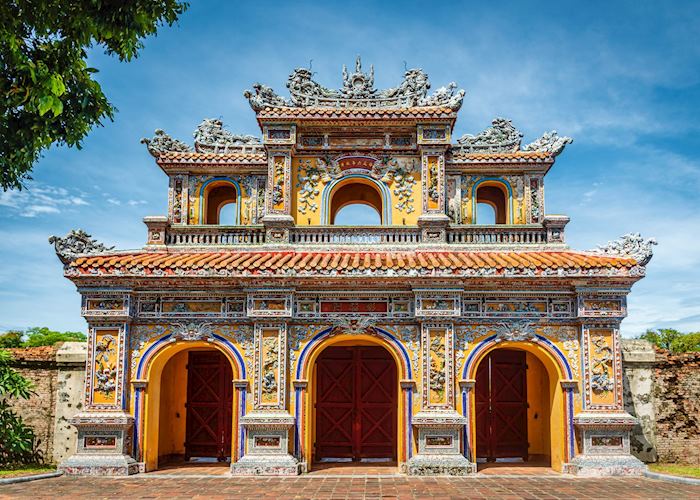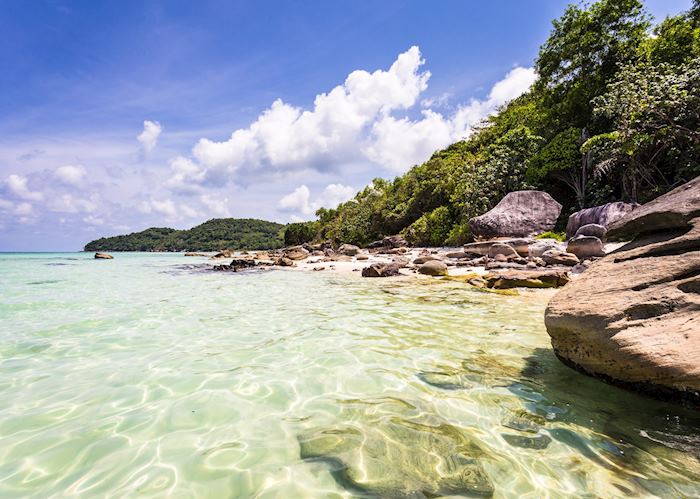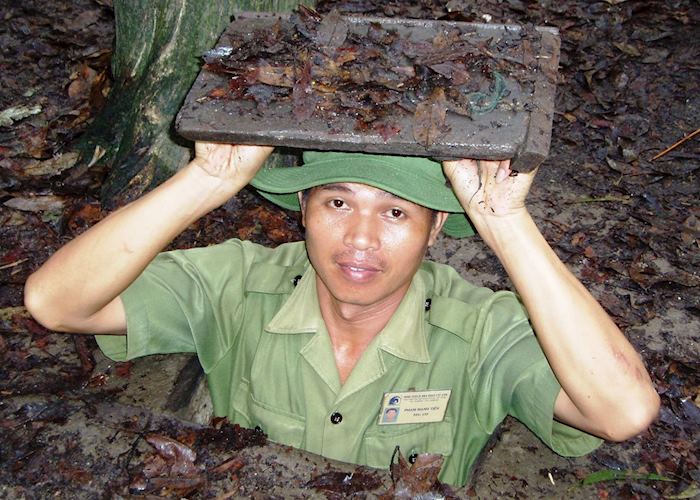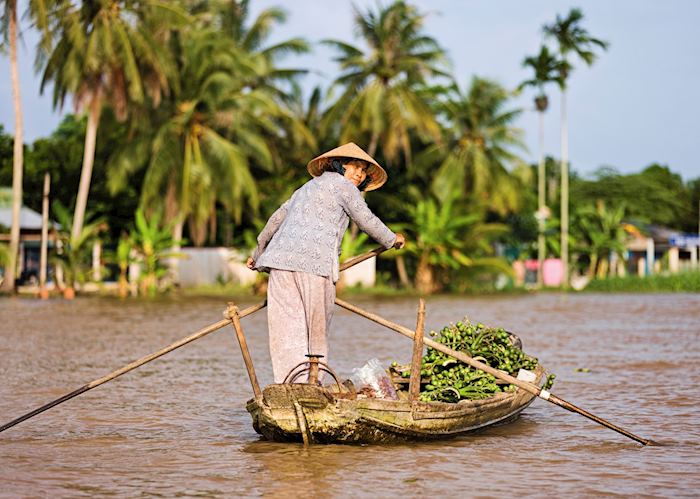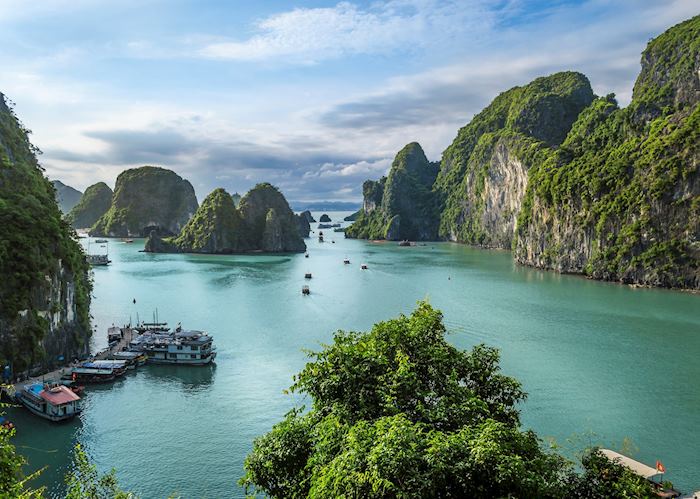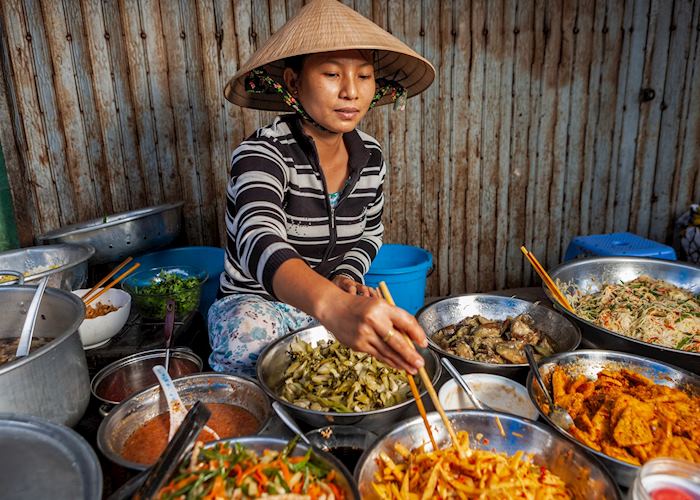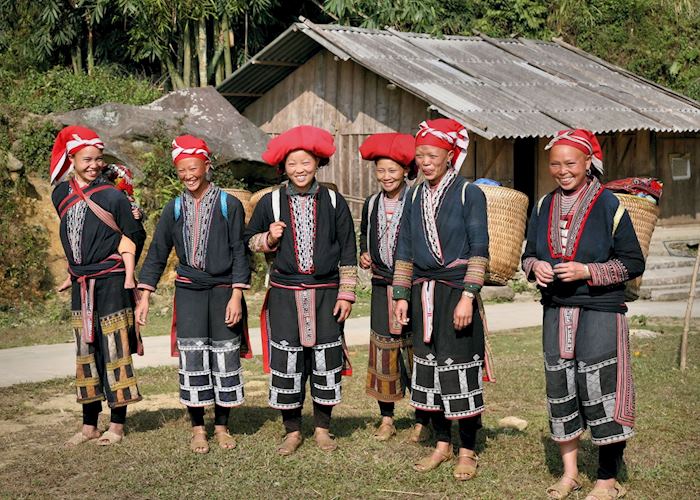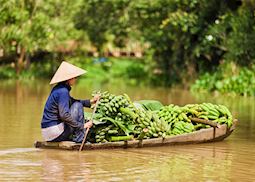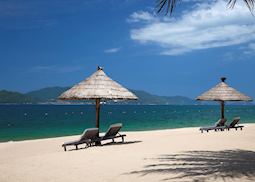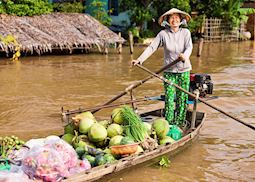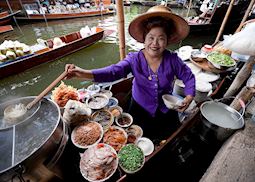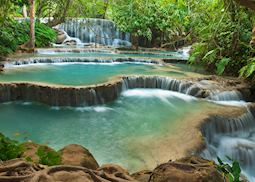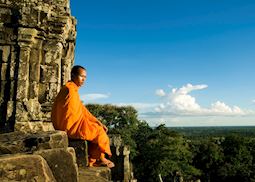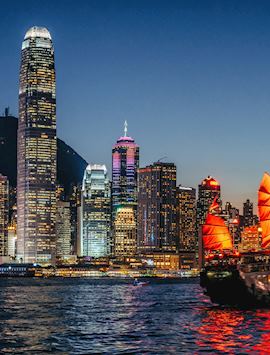
From the French-colonial architecture of Hanoi and the karst scenery of Halong Bay to the mercantile history of Hoi An, our Vietnam specialists will use their personal experience of the country to plan your holiday to Vietnam in detail. That might include arranging for you to view fast-paced Ho Chi Minh City from the back of a Vespa, or spend languid days cruising the Mekong Delta or by the beach in Ninh Van Bay. Or, it might be as part of a wider Asian voyage, sailing from Bali to Bangkok and stopping in Ho Chi Minh City along the way.
Travel in Vietnam is often based around a journey between Hanoi and Ho Chi Minh City, taking in the highlights of the central region between the two. Our Vietnam specialists can also suggest the country’s often overlooked, lesser-known sights and experiences, such as discovering brightly dressed hill-tribe communities in the Tonkinese Alps or the remote markets of Ha Giang — places and people we’ve come to know over 20 years of research and return visits.
Reduced fares currently available through our airline partners
We have a number of reduced fares available with selected airline partners. Click below for further details on booking and travel periods.
View offersSuggested tours for Vietnam
Drift among the karst scenery on a traditional junk in Lan Ha Bay, explore bustling Ho Chi Minh on the back of a Vespa, and learn to make traditional dishes at a private home in Hue — our range of suggested itineraries is a great starting point as you begin to plan your trip to Vietnam.
Suggested activities for Vietnam
Enjoy a guided tour of Ho Chi Minh City on the back of a Vespa, sample Hanoi’s best street food with a local guide, or cruise along the Mekong on a wooden boat. Whatever your interests, our specialists will suggest experiences designed to enhance your trip to Vietnam.
-
Hanoi street food tour ![Street food tour, Hanoi]()
Hanoi street food tour
HanoiHanoi street food tour
Set off on a street food tour of Hanoi's best culinary spots with a food blogger.
View details -
Hands-on rice growing tour ![Planting the rice]()
Hands-on rice growing tour
Hoi AnHands-on rice growing tour
You will be met at your hotel and transferred to the farm. On arrival you will meet the farmers and enjoy tea before donning traditional Vietnamese clothing (a conical hat and overalls) to prepare for getting into the paddy field.
View details -
Hoi An countryside cycling tour ![Local with bike, Hoi An]()
Hoi An countryside cycling tour
Hoi AnHoi An countryside cycling tour
Pick up your bikes and begin a leisurely ride through the beautiful countryside with your guide, stopping for photographs and refreshments as you please.
View details
Why travel with Audley?
- 100% tailor-made tours
- Fully protected travel
- Established for over 25 years
- 98% of our clients would recommend us
Best time to visit
Our specialists advise on the best months to visit Vietnam, including information about climate, events and festivals.
Request our brochure
Covering all seven continents, The World Your Way shows you how you can see the world with us. It features trip ideas from our specialists alongside hand-picked stays and experiences, and introduces our approach to creating meaningful travel experiences.
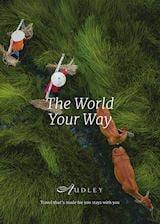
Useful information for planning your holiday in Vietnam
Vietnamese is the official language of Vietnam, but there is a huge variety of regional dialects that are spoken in casual conversation. You may also hear other languages, including Chinese, Khmer, and Lao as you travel across the country. English is also widely understood and spoken, and older generations still speak French as a result of the French colonial period.
The currency of Vietnam is the Vietnamese dong (₫), and the notes come in denominations of 200, 500, 1000, 2000, 5000, 10,000, 20,000 50,000, and 100,000 dong. However, it can be difficult to change high denomination notes in shops.
You can withdraw local currency at ATMs in all major cities, and credit cards are accepted in most larger shops and hotels, too.
We recommend trying Vietnam’s national dish, pho, which is a hearty noodle soup made with fresh vegetables, as well as trying juicy spring rolls wrapped in wafer-thin rice paper. Traditional Vietnamese food balances five key tastes — sweet, salty, bitter, sour, and spicy — and for an even deeper aroma, each dish comes with nuoc mam, a potent fish sauce, or mam tom, shrimp sauce.
We also recommend sampling ‘royal cuisine’ in Hue, a cuisine that harks back to the elaborate dishes created to impress the former Imperial court. We can arrange for you to visit the home of a local artisan chef there who’ll prepare a Vietnamese feast for you.
To drink, you can indulge in local coffee sweetened with a glug of condensed milk, a guaranteed pick-me-up after a morning of exploring. There are also a handful of local beers to try.
Tipping in Vietnam has become part of the culture, so we advise leaving a 10% tip at restaurants for good service in addition to any service charges. You should also tip guides, porters, drivers, and other service workers in Vietnam, preferably in local currency. The amount varies depending on how many people you travel with and the level of service provided, but we can go into more detail before you travel.
For the latest travel advice for Vietnam, including entry requirements, health information, and the safety and security situation, please refer to the Foreign, Commonwealth & Development Office website.
A trip to Vietnam blends dramatic forest-draped mountain scenery with historical towns and cities whose architecture showcases the country’s tangle of cultures. There are several UNESCO World Heritage Sites here, including the former imperial citadel of Hue and Champa Kingdom ruins at My Son, as well as a handful of jungle-blanketed national parks ideal for hiking and caving.
While Vietnam’s most notable sights might already be familiar to you, our specialists can help you get to know them more intimately. You could learn how to tend to one of Vietnam’s quintessential rice paddies with a local farmer, take a cooking class in an ornate pagoda on the outskirts of Hue’s royal monuments, or take a peek into a previously covert location in Ho Chi Minh City used to store the Viet Cong’s weapons during the Vietnam War.
There are a wide range of places to retreat to after a day of exploring in Vietnam, including beach resorts, heritage hotels, traditional junks, and city boutiques. For example, you could spend a night in a wooden merchant’s house in Hoi An, experience remote rural living at a homestay along the Mekong Delta, or rest your head at one of Vietnam’s most exclusive coastal resorts in Quy Nhon. There are also numerous boutique hotels right in the heart of Vietnam’s cities, so you can get up and go without needing to travel far.
Our specialists hand-pick every hotel in Vietnam, so they can help you explore and rest in a setting that suits you.
For a classic snapshot of Vietnam’s striking scenery and interlocking cultures, travel from Hanoi in the north down the coast to Ho Chi Minh City (Saigon) in the south. Along the way, you can cruise around the limestone karst pillars jutting out of Halong Bay, gaze at the vibrant mosaiced roofs of Hue’s old town, wander in and out of the eclectic buildings of Hoi An, and zip around Ho Chi Minh City on a Vespa.
If you want to go further from the traditional path, our specialists can craft a more intrepid route for you. You could trek the village-dotted Tonkinese Alps, or camp on the underground sands of a cave in Phong Nha-Ke Bang National Park.
It takes around 12–17 hours to fly from the UK to Hanoi in Vietnam. We recommend flying with Vietnam Airlines, Emirates, Qatar Airways, and a few other airlines, which we can advise on.
The time zone in Vietnam is GMT+7, and there’s no daylight saving time in the country, so the clocks stay the same all year round.
In Vietnam, we recommend taking private cars for short hops between cities and going by air if you want to get across the country because it’s expansive, stretching from China in the north to the Gulf of Thailand in the south. You can also take a traditional Vietnamese junk to cruise around uninhabited karst islands in the north, a luxury train through Central Vietnam’s forested countryside to the coast, or a private wooden sampan along the Mekong and into Cambodia to see the Khmer temples of Angkor.
Use our travel tool to find up-to-date visa and passport requirements for Vietnam. Enter where you’re travelling to and from (including any stopover destinations en route or flight layovers), along with your intended travel dates and passport details, for a full list of requirements.
Your doctor can provide you with immunisation and antimalarial advice for Vietnam. You can also check the recommended vaccinations by visiting the Travel Health Pro website.
Just note that there’s a risk of Zika virus transmission in Vietnam, so if you’re pregnant or trying to conceive, please consult with your doctor for advice.
We recommend wearing light, loose clothing in Vietnam to keep cool and respect the culture because, in general, Vietnamese people dress very conservatively, especially in areas away from the main towns and cities.
When visiting Vietnam’s temples, you should dress conservatively, covering your knees and shoulders out of respect. In some temples, you will also need to remove your shoes before entering, but never point the soles of your feet toward Buddha images or other people. What’s more, you should never sit with your back to an altar, point at anything or anyone, or touch statues. It’s also respectful to refrain from talking while inside, but occasional whispering is fine.
There are many customs in Vietnam that will be different from your home country, but, thankfully, your expert guides will be there to help you navigate and understand them. For example, they might teach you how to greet local people in the traditional way, take part in festivities respectfully, or even how to avoid things that are considered back luck, like leaving your chopsticks sticking straight up in a bowl of rice.
Vietnam in pictures
Our expert guides to travelling in Vietnam
Written by our specialists from the viewpoint of their own travels, these guides will help you decide on the shape of your own trip to Vietnam. Aiming to inspire and inform, we share our recommendations for how to appreciate Vietnam at its best.
-
![Vietnam: why you should go]()
Vietnam: why you should go
Southeast Asia specialist Alex explains why he thinks you should travel to Vietnam and shares footage from his recent trip across the country.
-
What to do in Vietnam: our highlights guide ![Fruit seller in the Mekong Delta]()
What to do in Vietnam: our highlights guide
What to do in Vietnam: our highlights guide
Visit a floating market on the Mekong Delta, try your hand at woodcut painting in Hanoi, or explore Ho Chi Minh City by vintage sidecar. Our guide will help immerse you in the sights, people and landscapes of Vietnam.
Read this guide -
Vietnam's best beach resorts ![Beach, Nha Trang]()
Vietnam's best beach resorts
Vietnam's best beach resorts
Bounded by the warm South China Sea, Vietnam’s sandy beaches are equal to any in the region. Add to this a range of sophisticated beach resorts and the scene is set for a quiet break in understated comfort. Vietnam specialist Mark picks his best of the bunch.
Read this guide -
Luxury holidays in Vietnam ![Halong Bay, Vietnam]()
Luxury holidays in Vietnam
Luxury holidays in Vietnam
Vietnam is home to a range of properties that you can include in your luxury holiday. From boutique hotels with their French colonial architecture, to desert island hideaways only accessible by boat.
Read this guide -
Vietnam family holidays ![Mekong River Delta, Vietnam]()
Vietnam family holidays
Vietnam family holidays
As a year-round destination you won't have to worry about taking the kids out of school to visit Vietnam. It's mostly malaria free and there are lots of activities on offer for all the family. You'll also be greeted with a warm welcome from the Vietnamese themselves.
Read this guide

